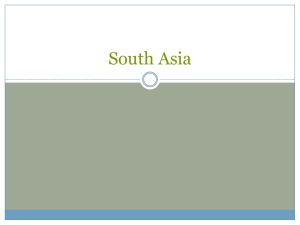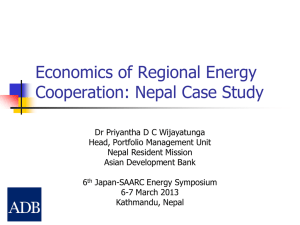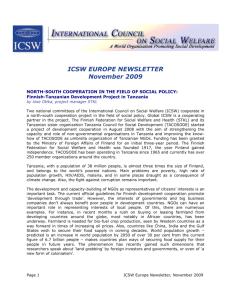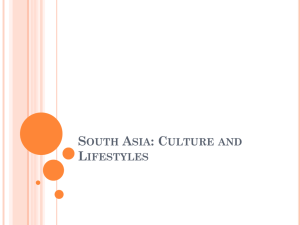South Asia Newsletter April - June 2012
advertisement
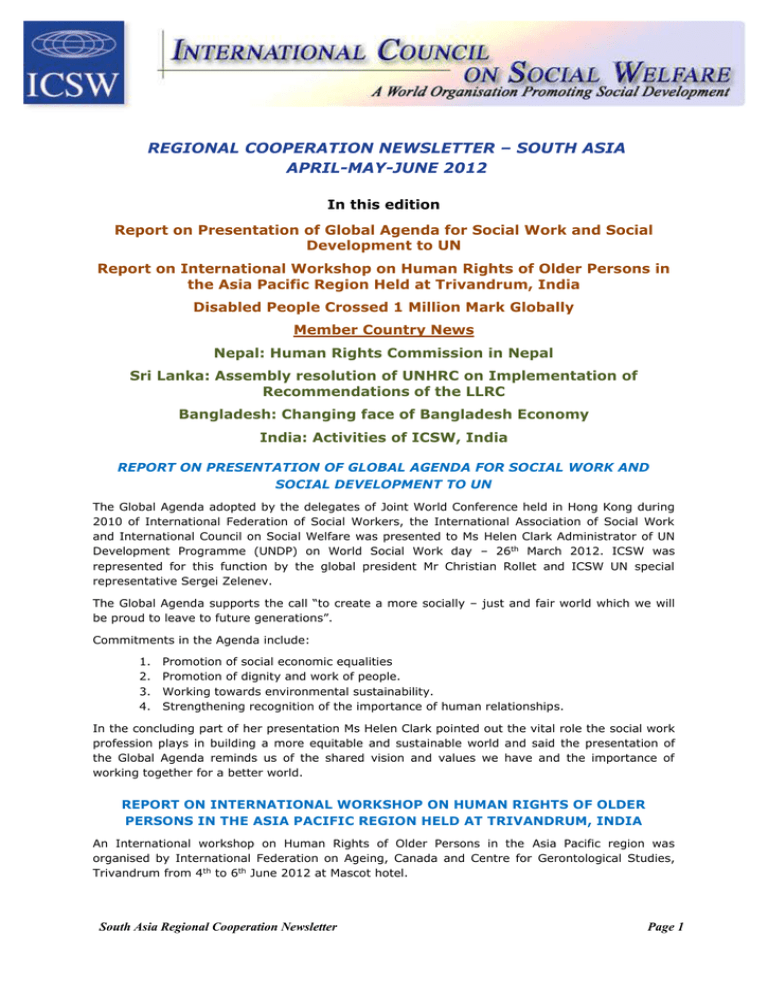
REGIONAL COOPERATION NEWSLETTER – SOUTH ASIA APRIL-MAY-JUNE 2012 In this edition Report on Presentation of Global Agenda for Social Work and Social Development to UN Report on International Workshop on Human Rights of Older Persons in the Asia Pacific Region Held at Trivandrum, India Disabled People Crossed 1 Million Mark Globally Member Country News Nepal: Human Rights Commission in Nepal Sri Lanka: Assembly resolution of UNHRC on Implementation of Recommendations of the LLRC Bangladesh: Changing face of Bangladesh Economy India: Activities of ICSW, India REPORT ON PRESENTATION OF GLOBAL AGENDA FOR SOCIAL WORK AND SOCIAL DEVELOPMENT TO UN The Global Agenda adopted by the delegates of Joint World Conference held in Hong Kong during 2010 of International Federation of Social Workers, the International Association of Social Work and International Council on Social Welfare was presented to Ms Helen Clark Administrator of UN Development Programme (UNDP) on World Social Work day – 26th March 2012. ICSW was represented for this function by the global president Mr Christian Rollet and ICSW UN special representative Sergei Zelenev. The Global Agenda supports the call “to create a more socially – just and fair world which we will be proud to leave to future generations”. Commitments in the Agenda include: 1. 2. 3. 4. Promotion of social economic equalities Promotion of dignity and work of people. Working towards environmental sustainability. Strengthening recognition of the importance of human relationships. In the concluding part of her presentation Ms Helen Clark pointed out the vital role the social work profession plays in building a more equitable and sustainable world and said the presentation of the Global Agenda reminds us of the shared vision and values we have and the importance of working together for a better world. REPORT ON INTERNATIONAL WORKSHOP ON HUMAN RIGHTS OF OLDER PERSONS IN THE ASIA PACIFIC REGION HELD AT TRIVANDRUM, INDIA An International workshop on Human Rights of Older Persons in the Asia Pacific region was organised by International Federation on Ageing, Canada and Centre for Gerontological Studies, Trivandrum from 4th to 6th June 2012 at Mascot hotel. South Asia Regional Cooperation Newsletter Page 1 About 60 participants including human rights activists, educationalists, researchers and representatives of the Senior Citizen Federation in India and representatives from abroad participated in this workshop. Prof. PKB Nayar, Chairman, Gerontological Studies, Trivandrum welcomed the gathering. The workshop was inaugurated by Ms Frederika Meijer, UNFEA representative for India. Ms Cai Cai, Social Affairs Officer UN ESCAP, Thailand delivered the keynote address. The guest of honour was Ms Mohini Giri, former Chair of the Women Human Rights Commission, India. The valedictory function was moderated by Dr K.R. Gangadharan, President, International Federation on Ageing and the valedictory address was delivered by Dr M.K. Muneer, Hon’ble Minister of State for Social Welfare. Inaugural Session Eminent speakers presented their views in the following technical sessions 1. 2. 3. 4. 5. The rights of older people to be healthy Country perspectives on the right to health and wellbeing. Role of civil society. The right to be safe – a human rights perspective. Lessons in advocacy on human rights Representing the International Council on Social Welfare at the workshop was Mr A.S. Shenoy, Regional President, South Asia Regional Committee. Dr Jane Barratt, Secretary General, International Federation of Ageing summed up the proceedings. Representatives from Thailand, Republic of Indonesia, Philippines, Hong Kong, Vietnam, Bangladesh, Sri Lanka, Switzerland, USA and Canada participated in the workshop. The workshop resolved to consolidate the working of various associations for elders working in each nation and to represent their voice collectively to the UN authorities by citing examples backed by evidence and to represent in maximum numbers in the next open ended working group meeting of the UN to be held in August at USA. A.S. Shenoy with Dr Jane Barratt and Prof Nugayho Abikusrio National Commission of Ageing Republic of Indonesia DISABLED PEOPLE CROSSED 1 MILLION MARK GLOBALLY The number of disabled people is rising and now stands at one billion or 15 % of the global population. According to the report of the World Health Organisation and the World Bank, despite a robust disability rights movement and a shift towards inclusion of disabled people many remain excluded and poor. One of the important issues highlighted in the WHO report was the discrimination of disabled people in health care. Disabled people in all countries are isolated, cash stripped and struggling to participate in normal activities. In developed countries disabled people are denied health care more than other people. Children with disabilities are less likely to start going to school than other children. The employment rate in OECD Countries for disabled people is 44% compared to 75% for people without disabilities. Disabled people need not be poor and excluded. They need not be segregated. There is a civil rights issue and civil society has to fight for the rights of people with disabilities. The UN has South Asia Regional Cooperation Newsletter Page 2 set an example in this direction by placing a duty on public bodies to promote equality and direct cash transfers to disabled people. MEMBER COUNTRY NEWS Human Rights Commission in Nepal The Human Rights Commission of Nepal formed during the last decade with international support was unable to give Human Justice to cases referred to the commission as per the published reports. The Commissioners of the Commission were reported to be engaged in multiple court cases including allegations of corruption and were plagued by internal problems which reduced the Commission to an administrative arm of the Government rather than an independent institutional body. But in 2011 the Internal Co-ordination Committee of the National Human Rights Institutions (NHRI’s) charged with accreditation has awarded the NARC of Nepal ‘A’ status certifying that the NHRC of Nepal is a functional and independent institution. Another bill was presented by the Government to the Parliament to establish a ‘Truth and Reconciliation Commission' (TRC) of Nepal. However the political leadership of the three major parties in Nepal intervened and moved to withdraw the bill from the Parliament. But in March 2012 these political parties agreed to table the draft TRC bill by removing section 25 (2) of the proposed bill which lists six unpardonable crimes including murder in captivity, murder of an unarmed person, rape, torture, forced disappearance and abduction. This decision to provide impunity violates basic tenets of International Human Rights and Humanitarian Laws. As per ACHR report, the time has come for the international community including the UN to stand against impunity in Nepal. Assembly resolution of UNHRC on implementation of the Recommendations of the LLRC in Sri Lanka The UN estimates about 100,000 people died during Sri Lanka ethnic conflict between 1972 and 2009. Rights groups say up to 40,000 civilians died during final months of the military campaign to crush the Tamil Tigers who waged a decade long campaign for a separate homeland for minority Tamils. UNHRC (United Nations Human Rights Council) at its assembly held in Geneva in March 2012 adopted a resolution asking Colombo to present expeditiously a comprehensive action plan detailing the steps to implement the recommendations of the Lessons Learnt and Reconciliation Commission (LLRC) and to address the alleged violations of International law. 24 members voted for the resolution, 15 against and 8 absented. Tabling the resolution, the US pointed out, Sri Lanka was given 3 years to hold its investigations into allegations of serious violations but there was a lack of action on the Sri Lankan side. The solution will be if Sri Lanka adequately addresses allegations of violations of international law during the war against the liberation tigers of Tamil Elam and to present a comprehensive action plan detailing steps to implement the recommendations of the LLRC. For this Sri Lanka has to be provided time and space to achieve the objectives of reconciliation and peace. Changing face of Bangladesh Economy 40 years of struggle for gaining sound economic health has started paying dividends in Bangladesh. The backbone of Bangladesh is agriculture which has shown spectacular growth in the GDP. 20.93% is attributed to the agricultural sector, 29.98% to the industrial sector and 18% to manufacturing sector. South Asia Regional Cooperation Newsletter Page 3 Bangladesh has now emerged as one of the leading suppliers of garments to the world. Along with the growth of the textile sector substantial achievements have been recorded in the areas of ship building and engineering products including motor bikes. For attracting international investments Bangladesh introduced the “Bangladesh Economic Zone Act 2010” establishing eight export processing zones with about 351 industrial units operating in free trade zones and attracting investments of two billion dollars. Activities of ICSW India Madras chapter of ICSW has moved to their own building. The state branches of ICSW are undertaking many community projects for the betterment of poor people. The Madras chapter has existed for more than four decades and is implementing various community service projects such as day-care centre for elders, crèches for children and a vocational centre for women etc. Dr K. N. George the senior most member of ICSW and a social worker was at the helm of ICSW Madras chapter. With his Lighting the lamp along commitment and passion for social work he was able to organise with Hon. Minister Ms. funds to construct a building for ICSW to use as a day-care centre for elders, crèche for children, Gokul Indira vocational centre for women and a permanent office for ICSW. The building was inaugurated on 4th May in Chennai by Hon. Minister of Social Welfare, Tamil Nadu state Mrs Valarmathi. Hon. Minister of Tourism Mrs Gokula Indira and Mr A.S. Shenoy National President of ICSW explained Social Development programmes of Tamil Nadu and activities of ICSW respectively. National President of ICSW A. S. Shenoy presenting activities of ICSW The content of this Regional Newsletter may be freely reproduced or cited provided the source is acknowledged. The views expressed in this publication are not necessarily the policy of ICSW. Please distribute this newsletter as widely as possible. Newsletter Editor: A. S. Shenoy, India Link Heritage, 6A, Chittoor Road, Kochi -682 018, Kerala, India +91 484 4023436 Regional President:A.S. Shenoy, India Email: shenoyas2006@yahoo.com Tel: +91 9995440154 If you wish to cease receiving this newsletter, please click 'here' and give us your name and email address. South Asia Regional Cooperation Newsletter Page 4



